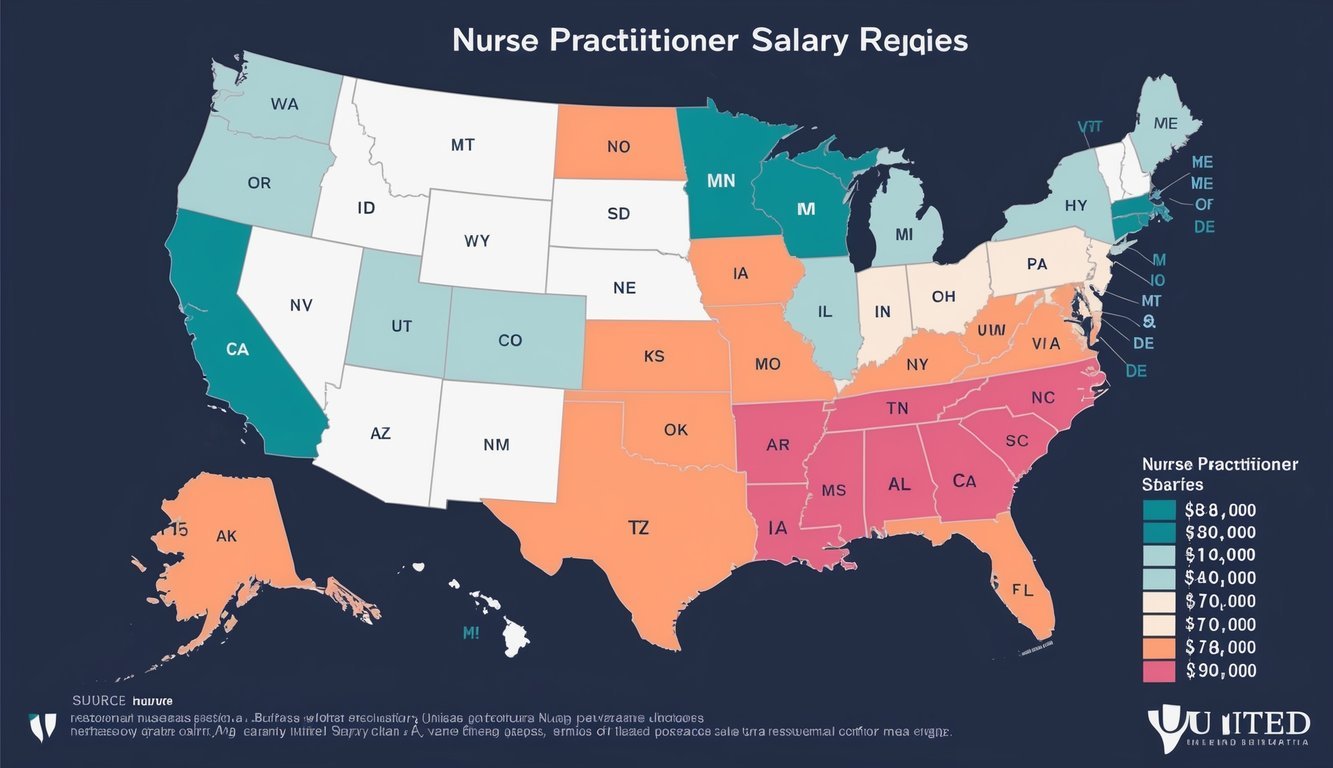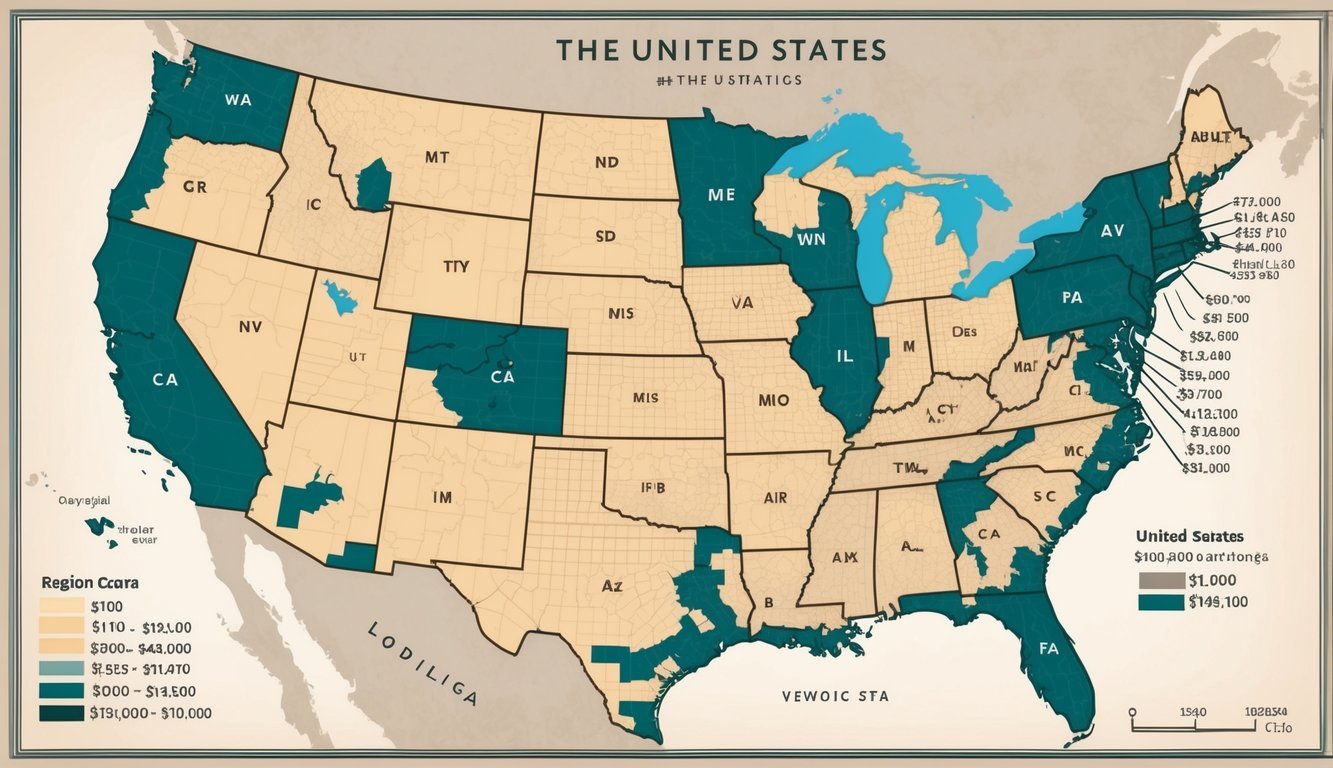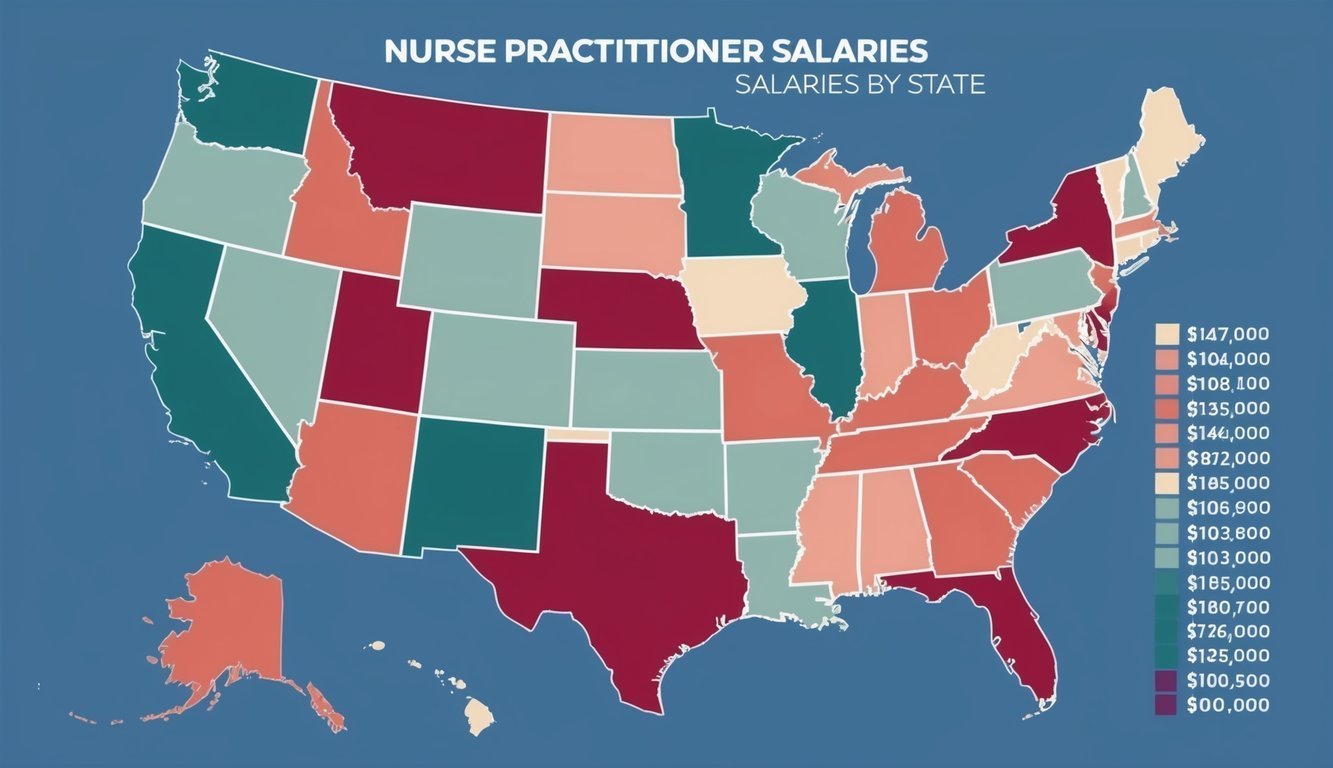Nurse practitioners (NPs) play a crucial role in the healthcare system, providing care to patients in various settings.
The average annual salary for nurse practitioners is $126,260, but this figure can vary significantly depending on the state you work in.
Knowing the salary landscape can help you make informed career choices or negotiate your pay effectively.
The demand for nurse practitioners continues to rise, driven by the need for accessible healthcare.
As advanced practice registered nurses, NPs can specialize in areas like family health, pediatrics, or mental health, which also influences their salary potential.
By understanding the average salary by state, you can uncover opportunities that align with your financial expectations and career goals.
Arming yourself with salary information is essential as you navigate this rewarding profession.
The variations in income across different states highlight the importance of location, specialization, and experience in determining your earning potential as a nurse practitioner.
Key Takeaways
- Nurse practitioners have diverse specializations influencing their salaries.
- Salary varies widely depending on the state of employment.
- The increasing demand for NPs reflects strong job opportunities in healthcare.
Nurse Practitioner Role and Specializations
Nurse practitioners (NPs) play a crucial role in healthcare, blending clinical expertise with patient care.
They often choose to specialize in specific areas, which can influence their practice and salary.
Defining the Scope of Nurse Practitioners
Nurse practitioners are advanced practice registered nurses who provide care similar to that of physicians.
They are trained to diagnose conditions, interpret diagnostic tests, and initiate treatment plans.
The scope of practice for NPs varies by state, influenced by regulations from bodies like the American Association of Nurse Practitioners.
NPs can work in primary care, specialty clinics, and hospitals.
They often focus on areas such as pediatric, family, or women’s health.
Their ability to prescribe medication also sets them apart from registered nurses.
Specialization in Nursing Practice
NP specializations are essential for delivering targeted care.
Here are some common NP specialties:
| Specialty | Description |
|---|---|
| Pediatric Nurse Practitioner | Focuses on children’s health and development. |
| Family Nurse Practitioner | Provides comprehensive care across all ages. |
| Acute Care Nurse Practitioner | Works with patients with acute illnesses. |
| Adult-Gerontology Nurse Practitioner | Focuses on adult and elderly care. |
| Psychiatric Nurse Practitioner | Addresses mental health issues. |
| Women’s Health Nurse Practitioner | Specializes in female reproductive health. |
These specialties not only shape your daily responsibilities but can also affect earning potential.
For example, a neonatal nurse practitioner often earns a higher salary due to the complexity and demand for specialized care.
Exploring nurse practitioner programs can help you find the right path for your career goals.
Education and Certification Requirements

To become a nurse practitioner (NP), you need to complete specific educational and certification steps.
Your journey typically begins with a foundational nursing program and advances through graduate education.
Understanding these pathways will help you plan your career effectively.
From BSN to NP: Educational Pathways
The first step is obtaining a Bachelor of Science in Nursing (BSN) degree.
A BSN program usually takes four years and covers essential nursing skills and knowledge.
After earning your BSN, you must pass the NCLEX-RN exam to become a licensed registered nurse (RN).
Once you are an RN, you can pursue a Master of Science in Nursing (MSN) or a Doctor of Nursing Practice (DNP) program.
MSN programs focus on advanced practice nursing roles, while DNP programs prepare you for leadership positions.
Many universities offer online nurse practitioner programs, providing flexibility for working nurses.
Licensing and Certification
After completing your educational requirements, you need to obtain certification as an NP.
This usually involves passing a national certification exam in your chosen specialty, such as family, pediatric, or adult medicine.
You will need to check your state’s specific requirements for licensing.
Most states have their own board of nursing that dictates the regulations.
Be prepared to provide proof of your education, clinical practice hours, and exam results to get your nurse practitioner license.
To find out more about requirements specific to your state, visit the Nursing Process for detailed information.
Salaries and Factors Influencing Income
Understanding nurse practitioner salaries can help you make informed career decisions.
Several key factors play a significant role in determining your income, including location, experience, education, and the scope of practice in your state.
Average Income by State
Nurse practitioner salaries vary widely across the United States.
According to the U.S. Bureau of Labor Statistics, the average annual salary for nurse practitioners is approximately $126,260.
Here are some of the highest-paying states for nurse practitioners:
| State | Average Salary |
|---|---|
| California | $145,979 |
| New Jersey | $141,000+ |
| Washington | $141,000+ |
| Nevada | $137,000+ |
| Massachusetts | $137,000+ |
States like California and New Jersey offer significantly higher salaries compared to areas with lower costs of living.
The data can shift as regional demands and healthcare needs change.
Experience, Education, and Earning Potential
Your earning potential as a nurse practitioner largely depends on your level of experience and educational background.
Entry-level positions typically start around $107,310 in states like California, while seasoned professionals can earn upwards of $165,140 annually.
Holding an MSN degree or additional certifications can boost your income.
Employers tend to favor candidates with specialized skills, which makes you a more competitive candidate for higher-paying roles.
Advancement in your career, such as transitioning to leadership roles, also enhances your earning potential over time.
Full Practice Authority’s Impact on Salary
Full practice authority allows nurse practitioners to evaluate, diagnose, interpret diagnostic tests, and initiate treatment plans without physician oversight.
States with full practice authority often result in higher salaries for nurse practitioners.
In states where nurse practitioners have full practice, such as California and Oregon, you might find increased job opportunities and higher salaries.
This authority can lead to greater independence and potentially enhance your financial outcomes by allowing you to establish your practice or work in high-demand areas.
Employment Outlook and Job Opportunities

The demand for nurse practitioners (NPs) is rising due to changes in the healthcare landscape.
This section explores the various work environments available and how current healthcare trends create job opportunities.
Work Environments and Settings
As a nurse practitioner, you can work in a variety of settings that cater to different patient needs.
Common environments include:
- General Medical and Surgical Hospitals: These facilities employ a significant number of NPs, providing acute care and specialized services.
- Outpatient Care Centers: Many NPs work in outpatient settings, offering primary care, preventive services, and chronic disease management.
- Home Health Care Services: With an aging population, home health care is becoming essential. NPs play a crucial role in assessing and managing patients in their homes.
Each of these settings offers unique opportunities, allowing you to choose an environment that suits your career goals and lifestyle.
Impact of Healthcare Trends on Opportunities
Healthcare trends greatly influence job opportunities for nurse practitioners.
The increasing aging population requires more healthcare services, leading to a higher demand for NPs.
The following factors are also shaping the landscape:
- Telehealth: With the growth of telemedicine, NPs can provide care remotely, expanding access to patients in rural or underserved areas.
- Focus on Preventive Care: There is a shift towards preventive and primary care. NPs can fill crucial gaps in primary healthcare systems.
- Policy Changes: States continue to pass legislation to expand NP practice authority, broadening your career options.
These trends indicate a positive employment outlook, making a career as a nurse practitioner a promising path in today’s healthcare system.
The Role of Nurse Practitioners in Healthcare Delivery

Nurse practitioners (NPs) play a vital role in the healthcare system.
They provide essential services that enhance patient care and fill gaps in medical practice.
Understanding their clinical responsibilities and authority is crucial for appreciating their contributions.
Clinical Responsibilities and Patient Care
Nurse practitioners are trained to diagnose illnesses and manage treatment plans.
They conduct comprehensive assessments, order diagnostic tests, and interpret results.
This allows you to receive timely and effective care, oftentimes in a primary care setting.
NPs serve diverse patient populations, including those requiring specialized care.
For example, neonatal nurse practitioners focus on the health of newborns, while psychiatric nurse practitioners address mental health needs.
Their expertise in various fields enables them to provide holistic care that addresses both physical and emotional health.
In addition to managing chronic conditions, NPs also promote preventive care.
They educate patients about healthy lifestyle choices and assist in disease prevention strategies.
This focus on whole-person care can lead to better health outcomes for you and your community.
Authority to Prescribe Medication
Nurse practitioners have the authority to prescribe medication in most states.
This power allows them to manage treatment effectively and adjust medications based on your needs.
Prescribing is a critical aspect of their role, ensuring you receive necessary therapies without referral delays.
The scope of what NPs can prescribe varies by state.
Some states have collaborative agreements, while others grant full practice authority.
This differentiation can affect your access to care.
Their ability to prescribe also includes a wide range of medications, from antibiotics to chronic disease management drugs.
This means that NPs can provide comprehensive services that improve your access to necessary treatments efficiently.
Frequently Asked Questions

This section provides insight into common queries related to nurse practitioner salaries across different states.
You will find specifics about salary differences, factors influencing pay, and the impact of specialties.
What are the salary differences for nurse practitioners in various states?
Nurse practitioner salaries can vary significantly by state.
For example, California offers some of the highest salaries, with averages around $145,979 per year.
In contrast, states like Arkansas may have lower average salaries, often below $100,000.
What factors influence the starting salary for a nurse practitioner?
Several factors affect the starting salary for nurse practitioners, including geographic location, level of experience, and the type of healthcare facility.
Nurse practitioners who work in urban areas typically earn more than those in rural settings due to a higher cost of living and greater demand.
How does specialty impact the salary of nurse practitioners across the United States?
Your specialty can greatly impact your salary.
Specialties like acute care, anesthesia, and psychiatry often command higher pay compared to primary care roles.
According to the data, psychiatric nurse practitioners are in high demand.
They may see higher salaries than their counterparts in primary care.
Which state offers the highest salary for nurse practitioners?
California currently offers the highest average salaries for nurse practitioners.
Reports indicate figures as high as $161,540 per year.
Other states like Nevada and Washington also provide competitive salaries, ranking near the top.
What is the salary range for nurse practitioners within critical care and psychiatric specialties by state?
The salary range for nurse practitioners in critical care can vary.
It typically falls between $110,000 to $160,000, depending on the state and experience.
Psychiatric nurse practitioners often see similar ranges, with some states offering averages over $140,000.
Are there states where nurse practitioners are in higher demand, and how does this affect salaries?
Yes, states with higher demand for nurse practitioners, such as California and New York, often provide better salary opportunities.
Increased demand can lead to more competitive pay and benefits.
This is because healthcare facilities strive to attract and retain qualified professionals.

